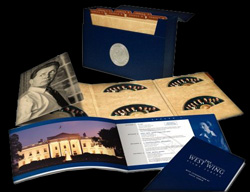 BUY IT AT AMAZON: CLICK HERE!
BUY IT AT AMAZON: CLICK HERE!
STUDIO: Warner Bros.
MSRP: $299.95
RATED: NR
RUNNING TIME: So many hours your chin will hurt
SPECIAL FEATURES:
- 154 episodes on 45 discs
- New to this set: Pilot script with foreword from series creator Aaron Sorkin and Episode guide
- Over 20 commentary tracks
- Over 20 Behind-the-scenes featurettes
- Unaired scenes
- Gag reels and more
The Pitch
Individual Reviews: Season 1 / 2 / 3 / 4 / 6
The West Wing is a unique animal. As you spend time with it, seven full years of legendary television, it almost lives two lives. One hand it’s one of the most, if not THE most incredible acting ensembles ever to grace a screen of any size but on another its frantic pacing and almost-too-clever jibber-jabber from the mind [initially at least] of Aaron Sorkin grows a little old. Sometimes its hard not to feel a little sold by the tactics of the show, which lures you in, as E.R. does, with frantic dialogue and a constantly bustling location to set you up for the next emotional wallop but as is the case with all Sorkin shows (Sports Night, Studio 60 on the Sunset Strip) they graft to your spine and become vital parts of the experience.
I for one find The West Wing to be the rare television show that changed me. It was the main instrument in restoring my faith in television, delivering meatier and more emotionally affecting material than most films and allowing me to learn more about politics [granted, in a softer and "glass is half full" sort of way] in a way that was seamless and transparent.
Before The West Wing I was a film snob whose attitude towards politics was "Just don’t mention it to me and I’ll go on enjoying my ignorance". After The West Wing I was a devotee to death of most of the cast as well as someone who realized that television wasn’t the culprit and that the right people can weave magic in any medium and as far as politics went, I’d opened my bonehead mind up just enough to let some of that stuff filter in and make me a really grumpy guy all of the time.
The show was transcendent for me and it’s a little too much to ask of art to take that kind of a role in your life, but it did. So for anyone who feels like this show was anything less than a cornerstone of the medium over the last decade, you simply weren’t looking close enough.
Thankfully, this amazing collection of discs is available to show us how a legacy is made.
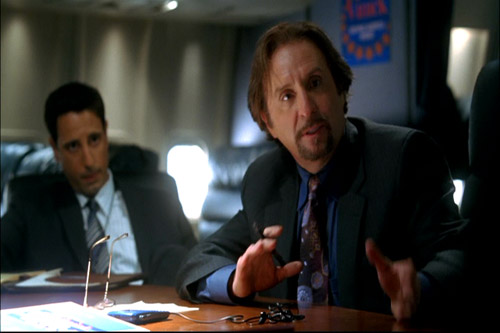
"But perhaps you weren’t in the right mindset to see The Arrival. You must try again, sir. Humanity depends on it."
The Humans
Martin Sheen. Bradley Whitford. John Spencer. Jimmy Smits. Josh Malina. Richard Schiff. Allison Janney. Stockard Channing. Janel Moloney. Alan Alda. Rob Lowe. Lily Tomlin. Kristin Chenoweth. Dulé Hill. NiCole Robinson. Ron Silver. Tim Matheson. John Goodman. Oliver Platt. Mary McCormack. Timothy Busfield. Mary-Louise Parker. John Amos. Moira Kelly. Gary Cole. Anna Deavere Smith. Teri Polo. Marlee Matlin. Janeane Garafalo. Patricia Richardson. Emily Proctor. Glen Morshower. Stephen Root. Annabeth Gish. Jorja Fox. Sam Bottoms. Roger Rees.

IT’S EVEN SCARIER THAN THE GOVERMENT HAS TOLD US IT WOULD BE!!!!
The Roundtable
I’ve written enough about this show for a lifetime and I fear by reading the reviews linked above that I’ve run out of ways to say that this show is brilliant.
So, I sought out four high profile members of the CHUD.com community who knew the show to discuss its legacy and the results sometimes are eerily similar in how we were all affected by the show. They are Matt Goldberg, Brendan Heldenfels, Matt Hindmarch, and AICN’s Latauro. I hope you enjoy this little roundtable of West Wing watchers, seasoned with my own feelings on the show to really create a web page that hogs your system resources with massive amounts of text.
Ruminating on the show globally, beginning to end…
Latauro (Email, Message Board): First of all, a confession: in Australia, we haven’t got seasons six or seven yet. This is because the network that owned them decided not to play them and… well, there was a big kerfuffle. But you should know that I’ve only seen to the end of season five. You should also know that I only consider seasons one through four to be the only real West Wing. This isn’t out of snobbery or blind loyalty to Sorkin; to me, the show is barely recognizable once the new writing staff takes over. I call it mediocre fan fiction with a big budget.
The West Wing appeared just as reality TV was becoming popular. This duality astonishes me still. This wave of lowest common denominator programs (which I prayed were a fad, but appear to be here to stay) seemed, in the beginning at least, to appeal exclusively to the lazy and unencumbered. At the same time, The West Wing didn’t pause and allow you to catch up. These people were working at the highest level of government, and there wasn’t time to turn to the intern/nephew/puppy character so everything could be explained slowly. Of course, there were explanations and there were characters like Charlie whose inexperience (in the beginning) demanded that complexity be explained to him, but Charlie was hyper-intelligent before he even begun.
When things were explained to him, he was still expected to keep up, and so were we.
The show’s intelligence didn’t come from technobabble; it was complexity instead of complications. The acronyms and references to thousand-year-old philosophers weren’t there to obscure any lack of story or point; they were there to illustrate and enhance both. You didn’t come away thinking "Man, those guys are too smart for me!". You were left with a deeper understanding of how a good writer constructs a speech, or given a Robert Frost quote you may not have heard before. It was never elitist; it encouraged you to come along and step up.
While there was occasionally a degree of intellectual snobbery from certain characters, those characters were inevitably called up on it by someone else. At one point, Bartlet emphatically states that so long as a person puts in an honest day’s work and is kind to his neighbours, "I don’t care if he never passed fingerpainting, that man is my brother". The importance that the show and its character places on intelligence was never to the exclusion of those who didn’t have it.
It was a show of ideas. The politics was just a forum for that. It took the idea of "Hey, what if government was run by good, honest people who were there because they were smart?", and — unfortunately for us — therefore became a fantasy series.
Brendan Heldenfels (Email, Message Board): The West Wing is both my favorite show of all time and the reason why I want to write for television, so anything I say from this point on has to be taken with a small grain of salt. While it was never the most popular show from a ratings standpoint, West Wing still remains a highlight of the Third Golden Age of Television. But I don’t think the show was particularly groundbreaking in its subject matter—the series is a workplace drama, plain and simple. However, several elements stand out that set the show apart from, say, Mister Sterling.
Its clever, fast-paced, theatrical dialogue—more along the lines of how we all wish we talked rather than how we actually do—brought elements of the stage to television and gave viewers some of the funniest, most quotable conversations in recent memory.
In the early years of the show, Warner Brothers and John Wells spared no expense, and the elaborate conversations that took place in the halls of the White House were often accompanied by equally elaborate tracking shots and cinematography. The directors, including Sorkin’s creative collaborator Thomas Schlamme, often remarked that each episode was like shooting a full-length feature due to the time and effort put into it, and it shows.
The show had some missteps in its seven years (“Issac and Ishmael” or Leo’s heart attack, anyone?), and struggled with its identity after Sorkin and Schlamme left after season four. While fan opinion is divided on the quality of those post-Sorkin years, the last season seemed to have remembered what made the show so special, and while I could have watched this show for as long as ER, I wish we had gotten one more year.
It was magical, though. I’ll always remember discovering it one summer on Bravo and DVD. This is one of those shows that’s had a profound effect not just on my goals, but on my outlook on life, and even if it hadn’t done all that, I’d call this one of the greatest shows of all time.
Matt Hindmarch (Email, Message Board): I was a late-comer to the West Wing party. I only viewed the program on DVD after threads and reviews on this site singing its praise. The West Wing has vaulted into the position of favorite television. I have devoured each DVD set faster than 24 or Battlestar Galactica, each of those also only being viewed on DVD, never on broadcast television. The depth of characterization, richness of performance and high-quality of writing drives the show, making a quiet political drama more thrilling to me than more action-based adventure programs.
I think Season 1 is a remarkable achievement. Where most programs take numerous episodes, even entire seasons, to find their footing, West Wing hits the ground running with confident scripting, and fully realized characters. Go back and take a look at the pilot episode if it’s been awhile for you. Marvel at how the characters you’ve come to love over the entire run are already fully present onscreen. There’s no “growing into” the roles here. This ensemble comes to play from the very beginning, and succeed remarkably for series television.
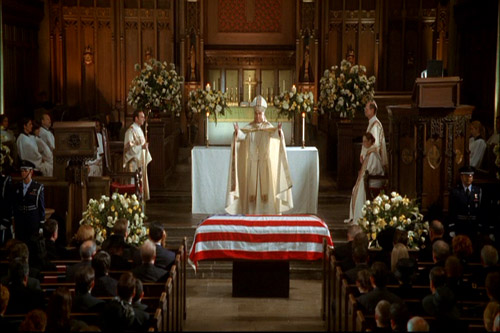
"Now come down to the casket… AND FEEEEEEEEAAAAAAAAAAAAAASSSSSSSSSSSST!"
The Best, the Worst, and the Most Underrated…
Latauro: My favorite? In a pinch, season two. It’s certainly the one that hit me the most. ‘The Portland Trip’ with its "Be poets" scene. The genius of Noel and Josh’s post-traumatic stress disorder. The one-two punch of ‘The Stackhouse Filibuster’ and ’17 People’, both of which were fairly high concept episodes that bled perfectly into one another (the chills I got during the ’17 People’ teaser were palpable). Then of course, the death of Mrs Landingham in ’18th and Potomac’. This holds an extra significance for me. When it screened in Australia and the episode ended, we were diverted directly to CNN to watch live as the second plane hit the WTC. This isn’t anything directly to do with the show, but it certainly helps illustrate why season two hit me so hard.
My least favorite? [/begin brokenrecord] Season five and (possibly) six and seven. They may as well have started speaking Sanskrit. [/end brokenrecord]
Most underrated is season four. I never felt any drop in quality in the first four seasons. ’20 Hours in America’, ‘Game On’, ‘Election Night’, ‘Evidence of Things Not Seen, Life on Mars…?’ And my favourite episode of the entire series, ‘Commencement’ (which I’ll come back to later). I suspect that when people think they know what’s coming, they tend to blame the show. A perceived slump in the fourth year is inevitable, but when I revisit those episodes they stand up as well as anything that came before.
Matt H: I think Season 1 is a remarkable achievement. Where most programs take numerous episodes, even entire seasons, to find their footing, West Wing hits the ground running with confident scripting, and fully realized characters. Go back and take a look at the pilot episode if it’s been awhile for you. Marvel at how the characters you’ve come to love over the entire run are already fully present onscreen. There’s no “growing into” the roles here. This ensemble comes to play from the very beginning, and succeed remarkably for series television.
Brendan: Season Two, from “In The Shadow of Two Gunmen” to “Two Cathedrals”, ranks as one of the best seasons of television I’ve seen, with not a single bad episode—there’s not even an “okay” episode in the lot. They all range from great to spectacular, every episode delivers on multiple levels, and the last five episodes, dealing with Bartlet’s revelation of multiple sclerosis, is probably the best storyline they ever did. Other standouts include “Noel,” “The Midterms,” “The Stackhouse Filibuster,” “Galileo”, and “Ellie.”
In the Sorkin years, I’ve always felt that Season Four was almost as good as Season Two, but I don’t know many who agree with me. Season Five, the first year without Sorkin, is the one that I’ve seen the least of. What I have seen, I haven’t really liked. As for underrated, those who quit watching after Season Five or after Sorkin left missed out. Season Six begins the election for Bartlet’s successor nicely, setting up Josh Lyman to find his own candidate, and there were many episodes in Season Seven that reminded me why I started watching West Wing in the first place, and why I continued to watch it.
Nick Nunziata (Email, Message Board): There’s a feeling that the show’s last few years dropped the ball in terms of delivering high quality television entertainment and I disagree entirely. Season’s five and six weren’t up to par with the previous four but they were still quite worth the effort. By the time Sorkin had been replaced and the so-called "downward spiral" began, the characters and storylines ruled the roost. The show wasn’t as effective and some of the focus changed, but it didn’t become an another show altogether. It was different but retained enough of the spirit of the show that made it what it was. Honestly, the characters are so good and the actors portraying them so on top of their game that it was fine to coast on residual glory for a little while.
The show certainly regained itself in the sixth season and aside from the well-intentioned but thoroughly uncomfortable live episode, season seven was fantastic. The passing of John Spencer certainly led to some unfortunately rushed story arcs but it also did make some of the already affecting moments that much more so. The characters lived such vibrant lives on the screen that the end, though never welcome, felt pretty damn good. I was a bit upset that the show didn’t revisit the scene from episode one of the last season where the gang reconvenes but all told it was a fitting end.
Each year had its share of best, worst, and underrated episodes but the resounding bottom line is that they all have enough merit to warrant their existence.
What the characters and actors brought to television…
Latauro: Richard Schiff is the man. It would be easy to play Toby as a grump, and easier to let that go halfway through season one once we’d got to know him, but Schiff didn’t go there. Toby was never grumpy for the sake of colour; he had a specific world view, and was more interested in respect that affection. That idea dictated how he played the character, and we ended up with someone who was infinitely more interesting than your typical grinch character. And his delivery! Who delivers dialogue like that?! Love it.
Matt Goldberg (Email, Message Board): It took a cast that was either unknown (show of hands for how many people knew Allison Janney, Richard Schiff, Janel Moloney, and Dule Hill before The West Wing) or needing the opportunity to unleash their potential for the first time (Rob Lowe, Bradley Whitford) or yet again (Martin Sheen, John Spencer, Stockard Channing). These actors would take Sorkin’s script and make the subject of discussion absolutely exhilerating through the now emblematic rapid-fire walk-and-talk or monologues that make you wonder why Sorkin didn’t become a speechwriter and why these actors hadn’t already broken out. The West Wing took all of its cast and made them must-watch actors. I tuned into "Psych" for Dule Hill. I no longer just think of Whitford as the villain from Happy Gilmore. And John Spencer went out with a glorious final role which deserves far more recognition than where I previously knew him: the douchebag who Connery tossed over a building in The Rock.
Brendan: Most politicians on television are self-righteous, sleazeballs, scumbags, or sex addicts, so West Wing’s portrayal of people who left very expensive jobs to serve the American public. While the conservative foes were frequently set up as the aforementioned self-righteous straw men, he did, from time to time, give us a conservative or a Republican whose heart was in the right place, even if his party wasn’t.
Even more than Sorkin’s dialogue, what made West Wing so special were the performances of the actors. Rob Lowe’s idealistic Sam Seaborn, Richard Schiff’s dark, pessimistic, determined Toby Ziegler, Bradley Whitford’s often ruthless, just as hapless attack dog named Josh Lyman, the charming, identifiable audience surrogates of Alison Janney’s C.J. Cregg and Janel Maloney’s Donna Moss, and the quiet Charlie Young played by Dule Hill—who, in seven years, never overplayed a scene or delivered a bad performance. These were all characters you rooted for, you believed in, ones you wanted to win and ones you wanted to have a drink with afterwards. These were the guys you wished were really running Washington.
Anchoring this great cast was Martin Sheen as President Josiah Bartlet. For a show like this, you needed a President who was believable, and boy, was Sheen ever that. Whether it was tearing into the religious right or struggling with his multiple sclerosis or lashing out at the strange mercy of the Almighty, Sheen may have gone over the top occasionally, but he was never uncompelling. Even when the show started to go down hill after Sorkin left, Sheen kept knocking it out of the park. Simply put, this is one of those all time classic television performances that he’ll forever be associated with.
Matt H: Bradley Whitford is my favorite of the accomplished cast. His character of Josh Lymon is the spontaneous voice of passion on the show. Sometimes he speaks too soon, getting himself into some political trouble, but it’s his heart doing the talking. You know where he stands and in what he believes. He’s a mercurial wit, rarely editing the quip for the sake of “correctness”. He’s lively and flirtatious, he’s intelligent and experienced, he knows how to play the game, and enjoys it immensely. He’s a pleasure to watch. His interplay with the other main characters, especially with his assistant Donna Moss (beautifully played by Janel Moloney), keep the show moving in unexpected and delightful directions. The playfulness of his characterization is also a fundamental reason why this show is such a success – you feel the friendship between the characters. They become a team that you care for and about. You become invested in their struggles. You celebrate their victories and feel their defeats.
This is not to take away from any of the other principle performers, all amazing. Richard Schiff, Rob Lowe, Allison Janney, John Spencer, Dule Hill and Martin Sheen are also stars in this firmament. Each of them is given moments that are incredibly funny and ones that are incredibly moving.
Nick: This show did a lot of good on a lot of levels but its crowning glory is its ensemble. Allison Janney went from a curiosity to a legend in this seven year run. Somehow, though the writers sometimes kept setting emotional pitfalls for her, she rose to be the show’s warmth throughout all adversity and competition from the rest of the cast. Seeing this actor and character go from an awkward and precarious role in Jed Bartlet’s white house to a poised and rich leader is a very rewarding bit of television drama and though she’s certainly been rewarded time and time again I think her work here often served as the glue that held things together. John Spencer was nothing less than sheer class from beginning to untimely end and his Leo McGarry is the most shaded and dense character on a show laden with richly conceived characters. It’s safe to say that no other actor and character are more connected in our memories than Spencer and McGarry when it comes to The West Wing. If Spencer had died in 1997, he’d be remembered as that really solid character actor who was in Presumed Innocent. Now, he has a serious legacy.
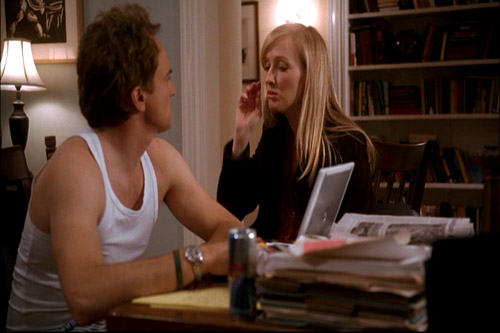
"I get it. But there are other ways to show your support for Ike Turner."
Our favorite characters and why…
Matt G: I know it’s the cliche answer, but it’s Bartlet. All of the other characters have their ups and downs but Bartlet is the heart of this show. Leo is the Brain, CJ is the mouth, Toby is the spine, Sam is the kidneys, but Bartlet is the heart and he makes you want to put a "Bartlet for America" bumper sticker on your car and 100% mean it. He’s everything politics should be. He’s a man who never aspired to be President but rather aspired to raise the national dialogue. He’s a man who, despite being absolutely brilliant, still has a thirst for knowledge. And yet he remains human. He’ll be surprised by the cutest things (like wanting to "play" with a map Charlie got him of 15th century Mesopotamia) and admits his own shortcomings in military matters. All of this done with the pure gravitas Martin Sheen brought to the role. When you think of Martin Sheen, three roles will always come to mind: Lt. Willard from Apocalypse Now, the bad guy from Spawn, and President Josiah "Jed" Bartlet.
Latauro: It changes on a weekly basis, and at some point everyone’s been my favourite. Er, Moira Kelly excepted. But in a pinch, I’d go with Bradley Whitford. He’s a deeply wounded character who never sees himself as such.
Almost everything he does seems motivated by the guilt he has for leaving his sister to die in a burning house, and even though it’s barely mentioned, that seems to be his core motivation. It’s almost as if helping Leo, the President or Hoynes is his way of atoning for that, and when he fails them it hits him deep.
Whitford plays smart, passionate and is even a prick at times, but it’s the occasional hint of rebellion or anti-establishment that makes Josh seem like a bit of an outside (despite his high rank), and I think this accounts for his popularity. Oh, and Whitford’s criminally-perfect comic timing.
Nick: It’s a toss-up between Bradley Whitford and Richard Schiff. If it were a toss-off between them I think Whitford would win, but this isn’t an article about masturbatory acumen (but a guy can dream). They’re two sides of a coin and their rapport and banter led to the most hilarious moments in the show as well as the jaw-dropping instances where it dawned on me just how brilliant Aaron Sorkin can be when paired with talent that can execute his wishes. There isn’t a lot of virtuosity on display in entertainment these days. Music is processed and emasculated, television is lowest common denominator, and films are focus grouped to death. This isn’t the Golden Age where talent could sing, dance, act, and deliver a punchline. Virtuosity has been replaced with photogenics and brand appeal. The West Wing is packed with virtuosity and seeing these two actors "rip shit up" is better than any action sequence money can buy.
Brendan: My friends tell me I have moments where I remind them of Toby, but the reason I love The West Wing –more than Sorkin or Bartlet or anyone else—is John Spencer and the White House Chief of Staff Leo McGarry. In talking about the show’s family dynamic, Bartlet is the mother—which makes Leo the father, and for six and a half years, he was. Often struggling with his personal demons and his political battles, McGarry proved, time and time again, that he was the heart and soul of this show, right up until Spencer’s death in 2005.
There’s a moment in the first season where Leo’s talking to a young aide who leaked some confidential information about his history of drug and alcohol abuse. Leo tells the girl (played by Paris from Gilmore Girls) a personal story about his father, and she asks him “Is that why you drank or took drugs?”
“No,” says Leo. “I drank and took drugs because I’m a drug addict and an alcoholic.” Coming across that moment on Bravo while flipping channels—that was the first sign that West Wing was just as wonderful as I’d been hearing, and maybe I should check it out.
To go into further detail about McGarry is to run through the show’s greatest hits—whenever there was a classic, moving, memorable, funny episode—nine times out of ten, Leo would be there. You could have taken Bartlet out of office and done six more years, maybe. But when Spencer passed, that was the end of the show for me. You couldn’t do the show without Leo. It just wasn’t possible, and the writers knew it—why else did they make him the Democratic VP nominee in Season Six?
John Spencer. He was The West Wing.
I can’t forget some great recurring characters played by some equally great actors. Everyone talks about Josh’s relationship with Donna and Bartlet’s with the great Mrs. Landingham played by Kathryn Joosten, but Leo’s long-suffering relationship with Margaret yielded some moments that were just as funny—when she tells him she knows how to sign the President’s name, for example. Anna Deveare Smith’s tough, uncompromising National Security Advisor Nancy McNally kicked ass and took names every time she appeared on screen, revealing her insecurities only once (about the sound of her voice). Admiral Fitzwallace, the Chairman of the Joint Chiefs played by John Amos, represented a noble, reasonable voice of the military right up until his unearned death at the end of Season Five—I still wish they’d made him Bartlet’s running mate. Bartlet’s VP, John Hoynes, frequently got shoved into the bad guy role, but Tim Matheson did a great job of playing him as a good man with a lot of political savvy and semi-questionable moral standards. While the youngest Bartlet daughter Zoey ricoched from charming to annoying depending on Elisabeth Moss’s performance, Nina Siezmako gets the “most woefully underused” award for her portrayal of middle daughter Ellie. Timothy Busfield’s Danny Concannon made me want to be a reporter as much as Richard Schiff made me want to be a communications director. Roger Rees played a drunken, lecherous British noble that you either loved or you hated—I loved the character of Lord John Marbury.
Matt H: Part of the strength of the show is how well the supporting cast and guest stars fill in the background. There’s a sense that they are full characters, too. They don’t seem to stop as soon as the cameras turn away from them, but continue with their lives, just not as a focus of the drama. Especially good are the aforementioned Janel Moloney (who properly vaults to principle cast status in later seasons) and Kathryn Joosten as Mrs. Landingham (whose departure from the show leads to my favorite West Wing scene of all – the “feckless thug” scene from season 2’s “Two Cathedrals”). Her monologue during Season 1’s “In Excelsis Deo” about why she gets down during the holidays is a lesson in understatement. Powerful stuff.
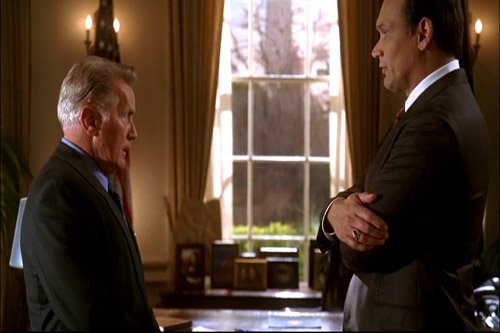
"Stop asking me that ques-" "What’s Emilio like? What’s Emilio like? What’s Emilio like?"
The relationship between the show and real life politics…
Latauro: I think one of the big appeals of the show is how idealistic it is. The show’s critics seemed to think that the idealism was all about pushing an agenda, but those people missed the point. The idealism came from the idea that the highest premium was placed on intelligence and honesty; that politicians, and, well, *everybody*, would hold themselves to a higher account than anyone in the real world.
Look at the big election arc. Robert Richie, Governor of Florida. A man who goes for the soundbites instead of the idea, who doesn’t appear to have any ideas of his own, who seems to look down his nose at intellectuals. The frustration that Sorkin clearly felt regarding Bush’s lack of gravitas is filtered through characters like Toby Ziegler, who can’t believe that they’re contesting against a "haircut from Florida". It’s easy to interpret this as kneejerk anti-Bush bias, but I think it goes beyond that. Sorkin appears to hold all politicians to a high standard, and is perplexed as to how people can be impressed not despite his unimpressiveness, but because of it. When he puts Bush clone Rob Ritchie in an election, I think it’s his way of asking the question: why?
When Bartlet embraces his intelligence instead of hiding it, the debate is a massive smackdown. The landslide victory of ideas and intelligence over poor communication skills and lazy thinking is idealism, and it’s the world that Sorkin wants to live in. Hell, it’s the world I want to live in.
Brendan: The theme of Sorkin’s work has always been not how things are, but how they should be, and that was certainly the case here. While it was written from a liberal, Democratic perspective in a liberal, Democratic administration, the show premiered in the last year of Clinton’s term and as Bush’s radical politics came ever to the forefront, it seemed more and more like a reassuring fantasy—how things could be, if all our Presidents were like Bartlet.
Unfortunately, we only got two years of rampant idealism before the events of September 11, and while Sorkin’s response to it—the episode “Issac and Ishmael”–is one of the worst things he’s written, I thought the show did well at taking on some of the more pertinent issues that came out of 9/11. Bartlet’s moral conundrum over political assassination at the end of Season Three is one of the highlights in an uneven season.
I’m in the minority, but I also think the show got better at presenting both sides of the issue and addressing them in clever ways once Sorkin left. Sure, we got caravan bombings and wars with China, but we also got actual discussion on things like African humanitarian aid and gay marriage, as opposed to one character telling another why they were wrong.
Matt G: I believe the first two seasons were content to live in nebulous politics. Issues were familiar but not necessarily current. Of course, like it did with most things, 9/11 changed all that. The fictional Islamic Fundamentalist nation of Qu’mar emerged as a terrorist threat and when Bartlet faced re-election, it was against a parody of George W. Bush. The genocide in Equatorial Kundun was the genocide in Darfur.
Of course, when the show stepped outside itself to address real life politics instead of using proxies, things went either very well (the out of place but still informative Documentary Special) or very poorly (the reactionary civics lesson, "Isaac and Ishmael").
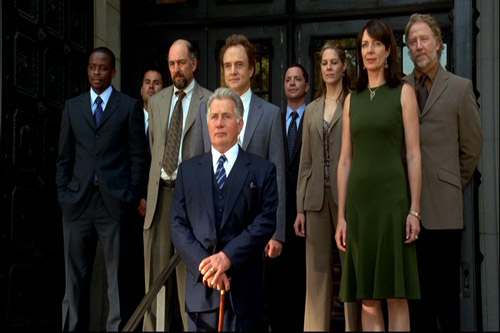
The majority of the staff was there to sign for the UPS shipment of Wolfen on DVD.
A few signature moments…
Matt G: For me, while almost every West Wing from the first four seasons features at least one brilliant quote or beautiful moment, there are three standouts:
In descending Roman order:
III. Some shows, like Battlestar Galactica and House, gradually become great. But other shows have a magic point. A point where everything that came before was good, but in one moment, the show ascends to a higher level. It sounds grandiose, but when you discover Locke was in a wheelchair on Lost or when Vic Mackey slams through a fence to catch a perp on The Shield, there’s a sublime moment and the show just becomes appointment viewing. And so it was when Martin Sheen, in the role that some would argue even eclipses his iconic work in Apocalypse Now, limps into the room and yet with more strength than Arnold Schwarznegger on horse steroids, he announces "I am the lord your God. Thou will have no other Gods before me." He then softly smiles and says "Boy, those were the days, huh?" It could go wrong in so many ways. President Bartlett sounds like a religious zealot. Bartlett has a God-complex. Watch absolute power corrupt absolutely. But Sorkin and his perfect cast easily manuver around all these pitfalls and instead come up with a show that makes "What’s next" not only its mantra and its motto, but a memory of every viewer who watches and wonders what next week will hold.
II. The final act of the episode "Commencement" has utterly sublime editing. So many issues are coming to a head. Donna and Amy discuss Josh (and it’s about as overt as Sorkin ever got about the Josh/Donna relationship). Josh and Charlie discuss Zoe. Toby and Andrea are about to have twins. C.J. and Danny discuss the assassination of Shareef. Zoe’s douchebag boyfriend has slipped half a hit of esctasy in her drink. It all builds in a slow and deliberate manner while the club music of Massive Attack’s "Angel" perfectly augments and accentuates the tension of all the scenes. There was only one episode where music was more perfectly utilized.
I. Arguably one of the best episodes of television ever made, "Two Cathedrals". How did Bartlett become Bartlett? Perhaps no other episode other reaches so close to the humanity of the world’s most poweful man. There’s a beautiful tragedy in a character who not only became President but a brilliant, Nobel-prize winning Economist and yet still feels inadequate because his father was a prick. And there’s a beautiful redemption when that character accepts his shortcomings, his fears, and his doubts, and decides to fight anyway. And in the episode’s final minutes, the montage featuring the music "Brother In Arms" by Dire Straits makes a transcendent show transcend itself.
Latauro: Toby’s "a rising tide sinks all ships" from ’20 Hours in America’. "Be poets" from The Portland Trip. "Bridges and tunnels" from ‘The Red Mass’. This is poetry, but it’s poetry used to illustrate points. Writing is an incredibly sexy thing when done correctly, and a well-constructed can be a powerful thing. Ideas are one thing, but the ability to express them is, possibly, even more important. My favourite scenes are the ones that, like the three I mentioned, sum up complex ideas in a simple but elegant way.
The other key moment actually goes to Alex Graves. ‘Commencement’ at the tail end of season four is my favourite hour of television ever, and most of that is down to Graves’s direction in the final fifteen minutes. I’m at loathe to spoil it for someone who’s not yet seen it (even though there’d be very few of them reading this article), but with odd exception, I’ve never seen anything that powerful on the small screen.
Brendan: To steal a cliché, it’s like asking a father to choose his favorite child, but off the top of my head:
–“Pilot” (Season 1, Episode 1): “She meant Jewish.” With three words and a look, Toby Ziegler shuts the entire room up and introduces us to his particular blend of self-righteous, dark sarcasm.
–“In Excelsies Deo” (Season 1, Episode 10): Mrs. Landingham tells Charlie about her sons dying in Vietnam, written as a big moment, but not played that way by Kathryn Joosten. Absolutely heartbreaking, and the first time the show made me tear up.
–“The Midterms” (Season 2, Episode 3): “It wasn’t a shooting, Toby, it was a lynching.” Just one of those stunning little moments this show did so well, leading the audience along before making you realize that yes, that was what this episode was about.
–“Let Bartlet Be Bartlet” (Season 1, Episode 19): The best summary of the show’s ideals comes at the end when Leo says “We’re going to lose some of these battles, and we may lose the White House, but we’re not going to be threatened by issues. We’re going to bring ’em front and center. We’re going to raise the level of public debate in this country and let that be our legacy.”
–“Posse Comitatus” (Season 3, Episode 22): Faced with the decision of having to order the assassination of a foreign leader, Bartlet confesses to McGarry that he knows what he’s about to do is absolutely wrong. McGarry tells him he still has to do it—“Because you won.” One of the rare moments in the show’s history where it didn’t play to Sorkin’s Capraesque fantasies, and one that had a devastating effect on all involved.
–“Celestial Navigation” (Season 1, Episode 15): One of the things this show did best was create humor that flowed naturally from the characters, and as a result, some deeply funny episodes followed. This is one of the best and funnier than most comedies at the time it aired.
–“Noel” (Season 2, Episode 10): I love “Two Cathedrals” to death, but if you put a gun to my head and made me choose my favorite moment, I’d pick Leo’s monologue to Josh at the end of this episode. I still tell my friends the “guy in the hole” story, and the way Spencer tells Whitford, “As long as I got a job, you got a job, you understand?” is the definitive statement on these characters—all of them—as an extended family.
–“Twenty-Five” (Season 4, Episode 22): Bartlet: “If they show me a picture of her alive and tell me to aim cruise missiles at Tel Aviv, they’re counting on the fact that a father—“ Leo: “But you wouldn’t.” Bartlet: “I might.” Leo: “There are people around who won’t let you.”
–“Two Cathedrals” (Season 2, Episode 22): Bartlet vs. God. It continues to amaze me that Martin Sheen did not win an Emmy during the whole run of this show.

"Son of a bitch", wondered Garafalo. "Has my back given birth to another The Arrival veteran?"
Some of the missteps the show took, above and beyond the Sorkin canning…
Latauro: I might abstain from this one, simply because — with big ol’ love heart in my eyes — I haven’t seen a big misstep in the first four seasons, and I consider everything afterwards (that I’ve seen) to be a series of missteps.
Oh, wait, there is one thing. Mandyville. Mandy disappearing at the end of season one. I can understand if she wasn’t working, I can understand if she disappears, and within the context of the show, I can even understand if they simply decide not to review her contract. But absolutely no mention of her afterwards?!? And why the hell did she disappear during a cliffhanger?
She would have had to resign her commission as the shooting was taking place! Actually, if my co-workers were being shot at by snipers, I’d probably consider resigning as well. But I’d sure as hell make sure I was on camera when I did it.
Nick: The entire Zoey (the president’s daughter who was kidnapped and the squeeze of Dulé Hil’s Charlie) plotline was irritating and detracted from the rest of the show. The Vice Presidents always got the shaft in the storyline department unless it was a device like Tim Matheson’s illicit behavior or Gary Cole’s implied weaknesses. These are actors and characters that would have added a lot of nice shading to the show even with minimal inclusion on some of the story arcs. Though they weren’t the focus, it was always nice to see them in the show and Gary Cole really shined while playing a wholly unique character for him.
Brendan: From JoAnne Galloway to Jordan McDeere, Sorkin loves to load up his strong female characters with a bevy of neuroses and that was certainly the case on West Wing. The show was heralded for its portrayal of women in the work place, but if it wasn’t C.J.’s inability to get a date, it was Donna hitting on fake Maureen Dowd. Almost every positive action was met with some kind of neurotic reaction, and that continued after Sorkin left. In the whole history of the show, I can think of four major women characters who made it through the show without being socially humiliated on screen: Nancy McNally, Mary Louise Parker’s Amy Gardner (politically humiliated, though, which is a whole separate issue), Mrs. Landingham, and Janeane Garofalo’s Louise Thornton.
The show’s political bias is documented, and even though Sorkin could write righteous oratory like no other, that righteous oratory often served as the only side of the show’s political debate. More often than not, Republicans and conservatives were presented just as token right-winger Ainsely Hayes described: “Mean, cold, and stupid.” Hayes and a few others were thrown in from time to time to give the appearance of fairness, but it really wasn’t until after Sorkin left that we began to get some actual dialogue on the political issues at play.
Matt G: To go beyond the Sorkin canning, you need to look at the missteps during his tenure. And Sorkin’s biggest misstep was his inability to write endings to characters and relationship arcs. You want a dollar? Tell me what happened to Mandy after season one. Everyone is wondering "who’s been hit" after the season one finale and she could be Bullet-Ridden Brenda lying in a gutter somewhere and not one other character would think of her name.